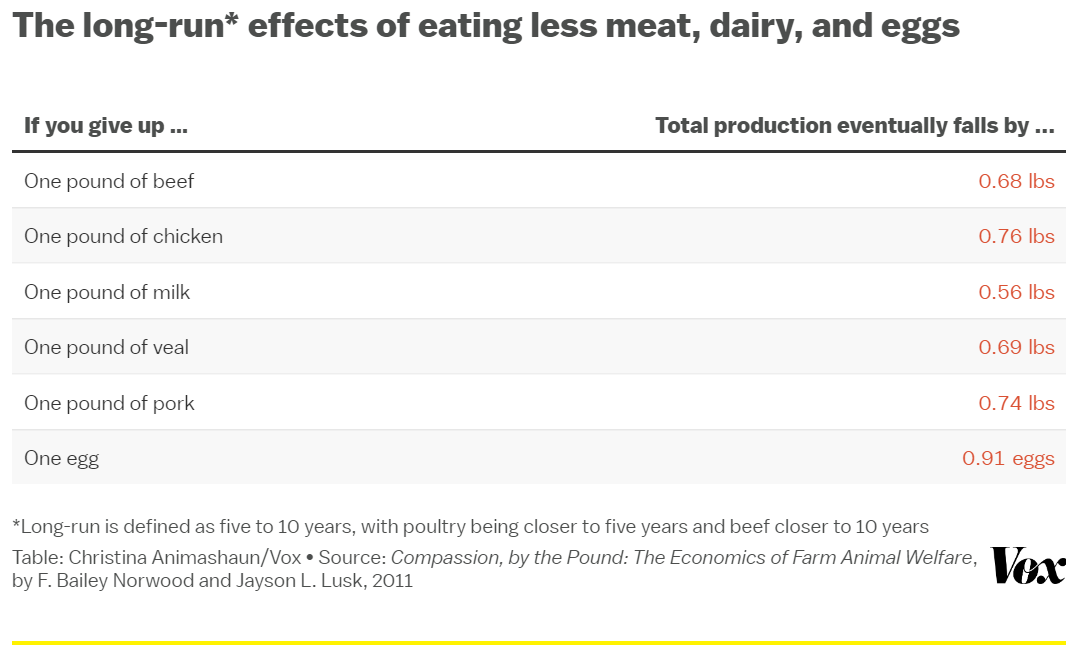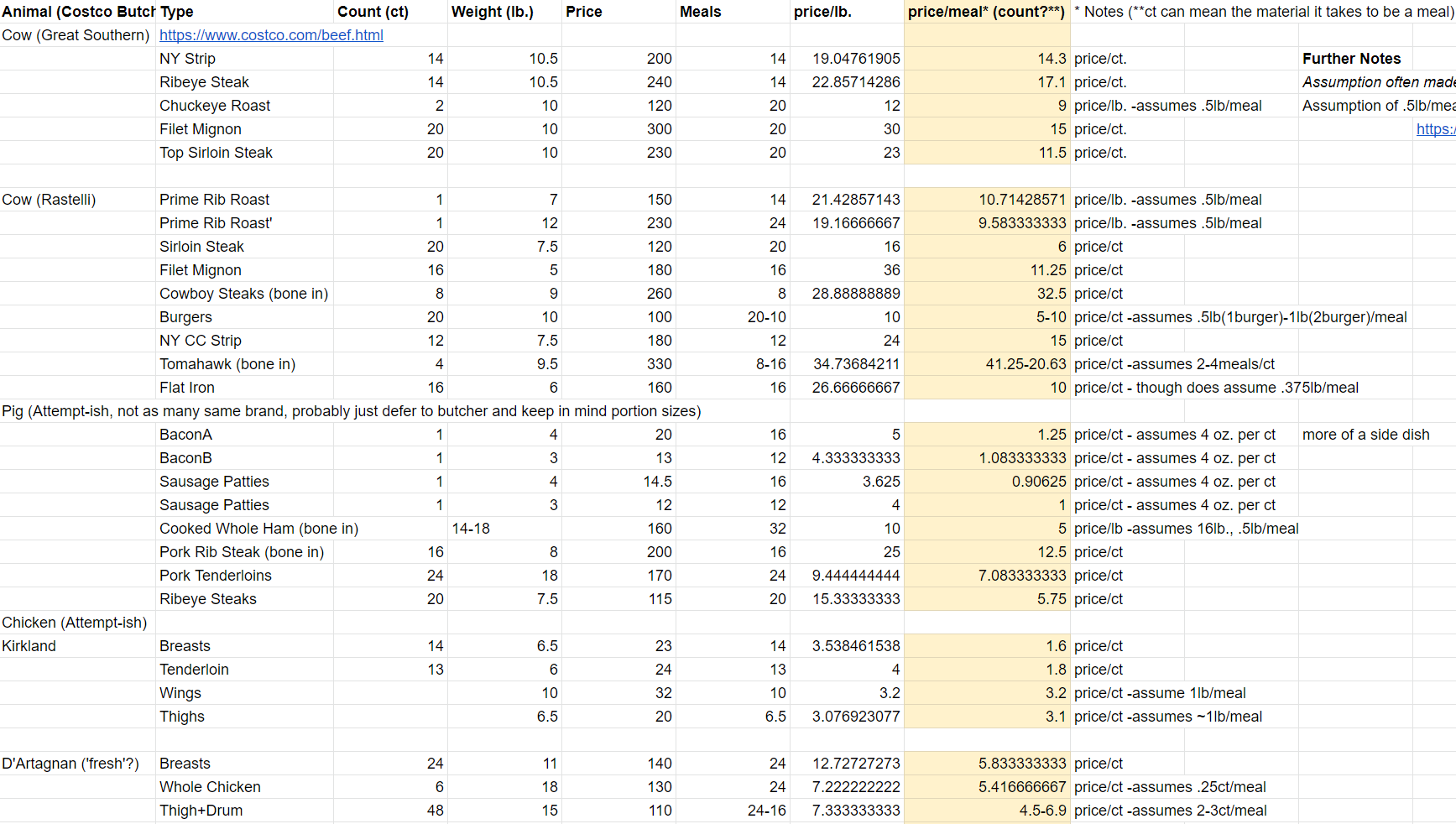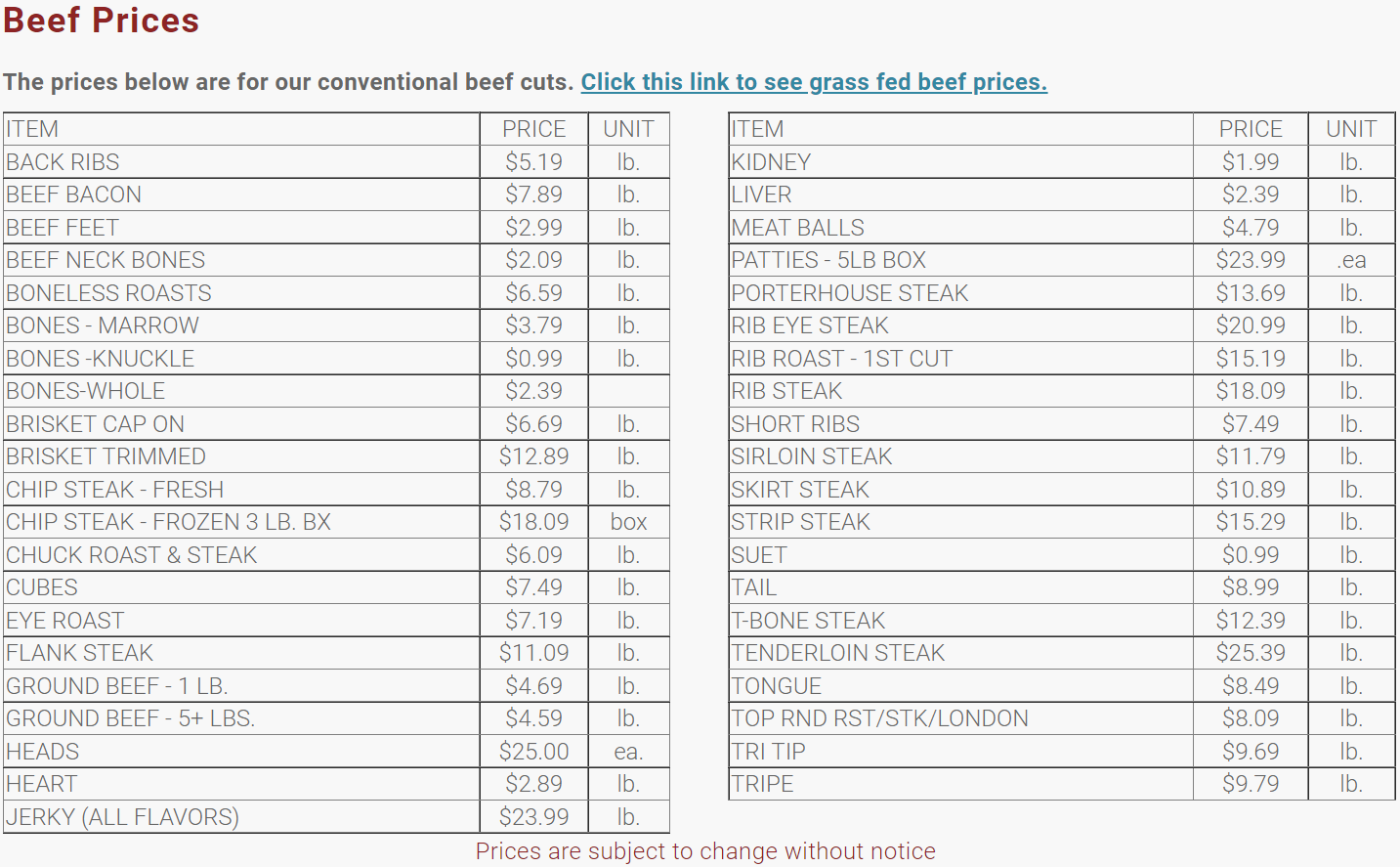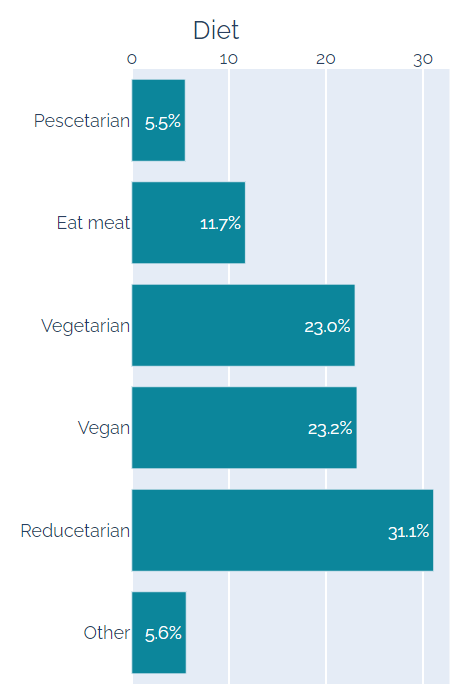Introduction:
Hello! This is my first full post. My epistemic status is, uh, pretty uncertain. I think my reasoning is pretty basic and I really do not understand the relationship between price and demand and the possibility of marginally reducing demand through one's individual decisions in consuming one cut of meat versus another from the same animal. This post was partly inspired by this VOX article which I used to cite a bunch while tabling for people to reduce meat consumption at my university.
(Relevant table from article):

Seeing the predicted effect of one's individual actions felt empowering and was at times a useful tool in convincing certain skeptics.
I suppose with this post I am hoping to raise a question I had, and could not readily find an answer to, of exploring the marginal impact of giving up more specific parts of an animal as opposed to a general 'pound' (I have no idea if Compassion, by the Pound explores something like this already). Hypothetically, I am claiming that the more 'in-demand' a part of an animal is, the pricier, and thus the more one contributes to the price of raising an additional animal the more responsible one is for their suffering. Just like with the table above, I do not expect it to be anything close to a 1:1 ratio (oh this is twice as expensive, twice as bad!), since everything seems pretty inelastic. But I defer to the fact that maybe some price differences can be different by more than a factor of 2x, and will explore the potential differences below. I also doubt the impact of something like this (a few people working in the animal welfare space I spoke with have expressed such doubts), and well, yeah, it is a marginal consideration. But marginal reducetarianism could also be pretty simple to sometimes consider (just defer to the price of one meat meal vs another of the same animal) and it could apply to a good part of the general population and even the EA community too.
Anyway, maybe consider this an appeal to cunningham's law and an effort to engage with the community and just write.
Question:
An absurd question from the perspective of animal welfare ("just don't partake at all"): Are there certain parts of an animal that are worse to consume, for animal welfare, than other parts? And if so, which ones are the worst, by how much, and how can we measure this? Within diets of meat consumption, how can we optimize further for animal welfare? How can we marginally improve reducetarianism?
AKA some of the situations that made me think about this: Which is the worse meal, chicken wings or chicken breast? I have an intuition that a meal that takes 8-10 wings is probably worse than a similarly portioned meal of a single breast[1]. What is the worst cut of beef to consume from an ethical perspective (what leads most to an additional cow, if we are voting with our money, that is)? I also have an intuition that filet mignon is a lot worse to purchase than ground beef which might be more of a 'less desirable product' (Saying 'byproduct' is probably pretty inaccurate since apparently every part of an animal slaughtered gets used pretty efficiently). How much less vegan is a meal cooked with some amount of fish sauce compared to one primarily considered fish or without any animal product at all?
What leads to marginally more demand for an additional animal to be produced and slaughtered?
I think as someone who is a 'reducetarian', I may have been too binary in my consideration of what is a ‘meat meal’, all while recognizing that this question is absurd and probably quite small impact-wise. So here's what I found to be the extent of these differences.
Answer (Attempt):
Main Question: If I am going to eat a meat meal, what animal products contribute most to animal suffering, as defined by which animal products, with a marginal increase of demand (your purchase of animal product), lead to the greatest marginal increase of supply (animals factory farmed)?
I am assuming that the demand here can be reflected as a proxy of price, a useful quantification for comparison. A higher price/meal is in higher demand, many things being equal (trying to control for quality by doing same-brand same-quality-meat comparisons, at a market value (not in a restaurant where additional costs like prep and sides confound) and control for quantity by adjusting all prices to what a 'meal' would consist of as opposed to just going by price/lb. when certain cuts contain bones (also note that what consists of a serving could be important, e.g. I am assuming you are more likely to eat the amount you are served, imagine a 5 oz. filet mignon serving versus a 12 oz. NY Strip sitting on someone's plate)).
I set about trying to make all things equal by comparing the costs of different cuts of meat from the same brand on the costco wholesale grocery site. Here is my summary of this Costco data, which I tried my best to make a price/meal comparison (it appears Costco has removed some options from their site or perhaps they are location specific, oops). If you want a more straightforward comparison you could just use the butcher sites or the USDA site listed below which compares price/lb.
Costco:

Note: Assumption often made that 1 ct (e.g. 1 filet mignon presliced portion)= 1 meal, except when otherwise noted (e.g. tomahawk steak is assumed for at least two people, and on flip side burger may average more of a 1.5 burgers) and/or I tried to follow what online serving sizes were (recommended ~3-4 oz., but I primarily assumed people would limit themselves to a serving size of 1 ct (presliced portion) as opposed to getting more/less meat). Further note the attempt to only compare the same animal 'quality'.
Here is also a chart taken from the USDA regarding meat price spreads for the past couple years: Retail prices for beef, pork, poultry cuts, eggs, and dairy products - it reflects similarly that beef has a greater range compared to other products which are much more comparable in price.
And here is one last source from a butcher which is much more comprehensive across all the 'conventional beef cuts'. Links for poultry, pork, and even grass-fed beef.

Some of my Key Takeaways:
- I had a lot of uncertainty, particularly with portion sizes. I tried my best but there is a range of eaters and averages are hard. It could be that price/lb. works just fine, and it seems to for the most part but I do have a couple intuitions that made me want to try price/meal:
- People are more likely to eat a 'serving', which often depends on how a piece of meat is cut and served.
- Bone-in (particularly this for using weight), whether the meat is a main or side dish, and the loss of moisture/fat in cooking are also things to consider.
- Here are some differences I noted with regard to my initial questions.
- The most extreme difference at Costco, the sirloin steak or burgers versus the tomahawk or cowboy steaks, differed by a factor range of 2x-8x depending on portion size. The USDA sheet demonstrates a similar difference.
- Wings/thighs do seem to be twice as costly per meal as breasts/tenderloins, though again I do not mean to say they are necessarily twice as bad and I also am suspicious of my own meal portion sizing here.
- Most of the 'price/meals' seem comparable enough to not merit too much attention, though there do seem to be outliers like larger and more sought after cuts of beef in particular that range above a 2-3x difference. Where on this butcher site, there is a max difference of ~5x: Boneless Beef Tenderloin Filet $15.99/lb. vs Fresh Ground Beef (73% Lean) $2.89/lb. (5# package - $2.39/lb.)
- Perhaps the most signficant 'marginal reducetarian' action someone can take beyond not eating a meal is to just eat the suggested portion size (3-4oz.), as opposed to committing to some whole steaks which can double or even quadruple the amount.
- One policy I am leaning toward here is that in general when it comes to meat in addition to reducing meat consumption you can also try to spend as little as possible, and this may check out for other animals that I have explored as well like some fish (e.g. fatty tuna vs lean tuna).
The idea that some cuts of meat are marginally worse than others from other animals should be considered for more extreme cases, though there do not seem to be many good applications. And at this point I think I have sort of proven to myself this was probably not worthwhile to look into. But anyway, an easy use case for this seems to be just avoiding the most expensive and sought after cuts of certain animals, namely beef, since hypothetically one could effectively be contributing 2+ meat meals in a single meal. Not to mention just reducing portion sizes, or even just reducing your meat consumption by a meal at a time per week or something along those lines. I might suggest a small heuristic that if one cut of meat is much more expensive relative to a cut of meat from the same animal, it should be avoided, though yeah just avoiding it altogether would be ideal.
Further Considerations
(I am just going to just footnote these, main post done):
Why is this relevant, to who? [2]
This relevancy and a small info hazard.[3]
Modifiers on consumption.[4]
Meta EA:[5]
- ^
Yeah, here begin the difficulties in measuring what a 'meal' is across different parts of an animal. Pretty subjective but I did try to appeal to authority (cooking blogs, googling, 'how much does x feed?') and should probably do it by caloric value.
- ^

Source: EA Survey 2019 I am also curious why recent EA Surveys do not have a diet question.
Who is this for? Anyone who eats meat. And in EA, specifically reducetarians (~31.1% of respondents to 2019 EA Survey) and those who eat meat (11.7%). But also, perhaps many of the pescetarians (5.5%), vegetarians (23%), and even vegans (23.2%) that might either be underreporting their meat consumption or at risk of vegetarian recidivism in the future. More on these last two points from this ACE article:
“Of those who identified as vegetarians, 64% had eaten what the study considered a non-negligible amount of meat in one or both 24 hour periods.”
Though it is important to note that they had eaten:
Significantly less (74% by weight) of meat compared with nonvegetarians.
A meat meal which was significantly more likely to be fish.“In their representative sample, 10% of respondents described themselves as former vegetarians, whereas only 2% were current vegetarians.”
Which may indicate that the majority of vegetarians (unsure of other dieting groups) eventually return to a meat-based diet, though this seems to be cited as more inconclusive in evidence compared to the overreporting stats.
- ^
I recognize that there may be a small info hazard here that encouraging people to consider compromises within eating meat could make it harder to define a line they can avoid crossing - per St. Augustine, “Complete abstinence is easier than perfect moderation.” I struggle at every meal meat is offered without a vegetarian option to say no, as opposed to having a grander narrative in my life I can identify with and defer to - “No thanks!”
But imperfect moderation might be made easier with acknowledging some additional info - informed decisions and awareness of one’s decisions, as well as something from “Atomic Habits”, which encourages one to commit to an identity - e.g. “I’m trying to quit smoking” vs “I’m not a smoker anymore.” The second is more powerful (actually search up his example…) the same way committing to being a vegetarian even if you fail it at times makes you more likely to keep with the identity, you are held to it.
- ^
I suppose the ideal would be a case where we know the moral weight of every action, and are able to compare the harm or good done by purchasing x vs y good, though I think I read somewhere within EA community a negative opinion of such ethical consumption, and as a friend said regarding this post, "this sort of seems like a rounding error compared with something like AI".
By modifiers what I mean here is that we could attribute a weight in animal consumption with regard to how much we concern ourselves with the different environmental impacts of the animal in question as well as animal welfare.
- ^
I think the benefits of being vegetarian or vegan on a meta EA level are just as relevant a motivation as animal welfare or the environmental considerations. Performing what might be considered 'sacrifice' (giving up something others actively desire, limiting one's options in certain circumstances, separating oneself from the social norm) has previously been great optics when I would advertise EA at my university. It demonstrated action, when so many college students were asking us, "But what good are you guys actually doing right now?" Rather than just being able to answer abstractly of some impact in a future career, or of spreading the movement (talk about pyramid schemey), I could also cite trying to reduce my own and other's meat consumption on campus. Good for community building since most college students (from my experience tabling at my university) really do recognize they should probably reduce their meat consumption.
It seems like reducing meat/animal products consumption and committing to eventually donating some percentage of one's income could form a good baseline "Task Y" which EAs should be aspiring toward, and there may be some good 'virtue signaling' from this. Considering the community survey, it really is so impressive that we have such a large population of veggie individuals, and probably demonstrates good epistemics that people are committing to action with their beliefs.
As someone who has previously drifted away from the movement (during covid), I am trying to be more intentionally engaged with things I am passionate about. To prevent future value drift, it seems like not allowing my intentions to slide and committing to certain behaviors is a good investment to ensure my future self is still considering the things I hope he will be.
It also forms a sort of hedged bet for my impact, which does not rely on the success of some abstract idea or project of my own, to do a sort of parliamentary moral system where I try to contribute to all the major cause areas - not to mention maybe some sort of moral inhibition toward causing direct harm by eating meat/meat products.
One last thing - I will note that I think there are other good intermediary steps on the way to reducing your meat consumption further - something that has been a really good bulwark for me is that I do not cook meat anymore at home. Definitely curious to hear others thoughts, on everything above too.
